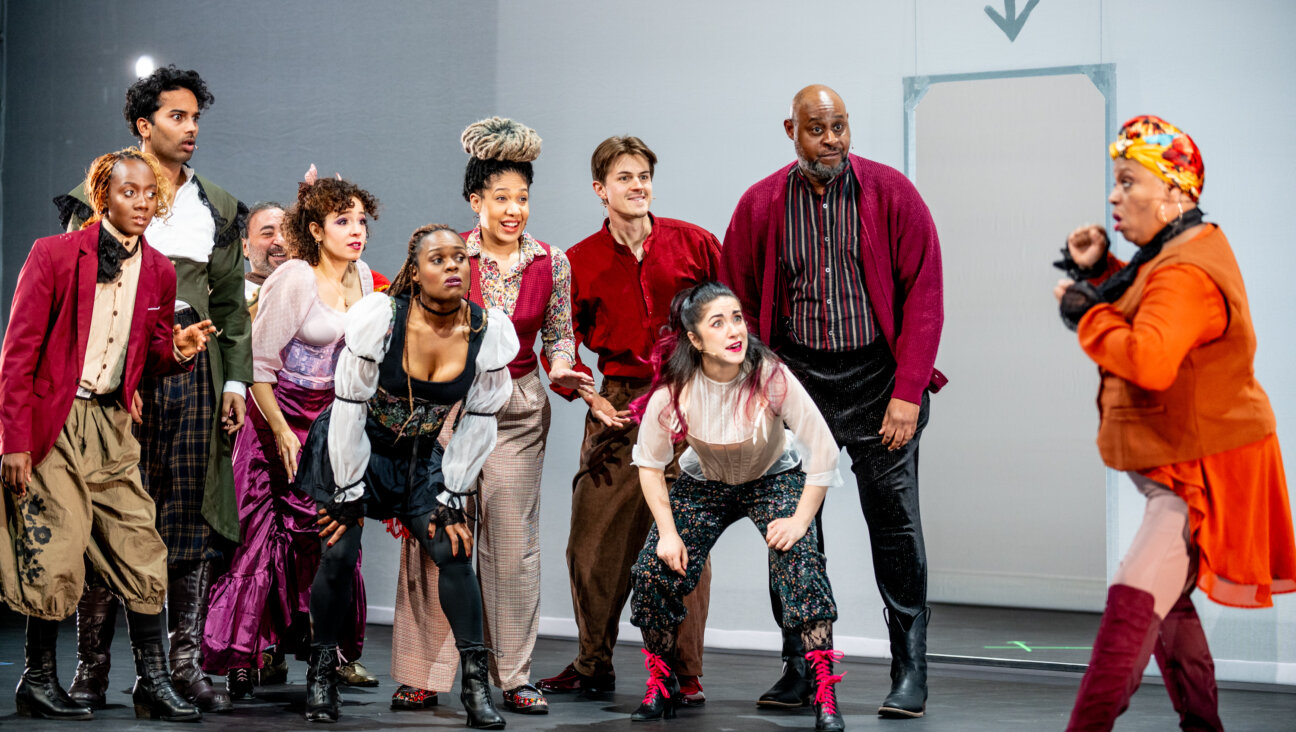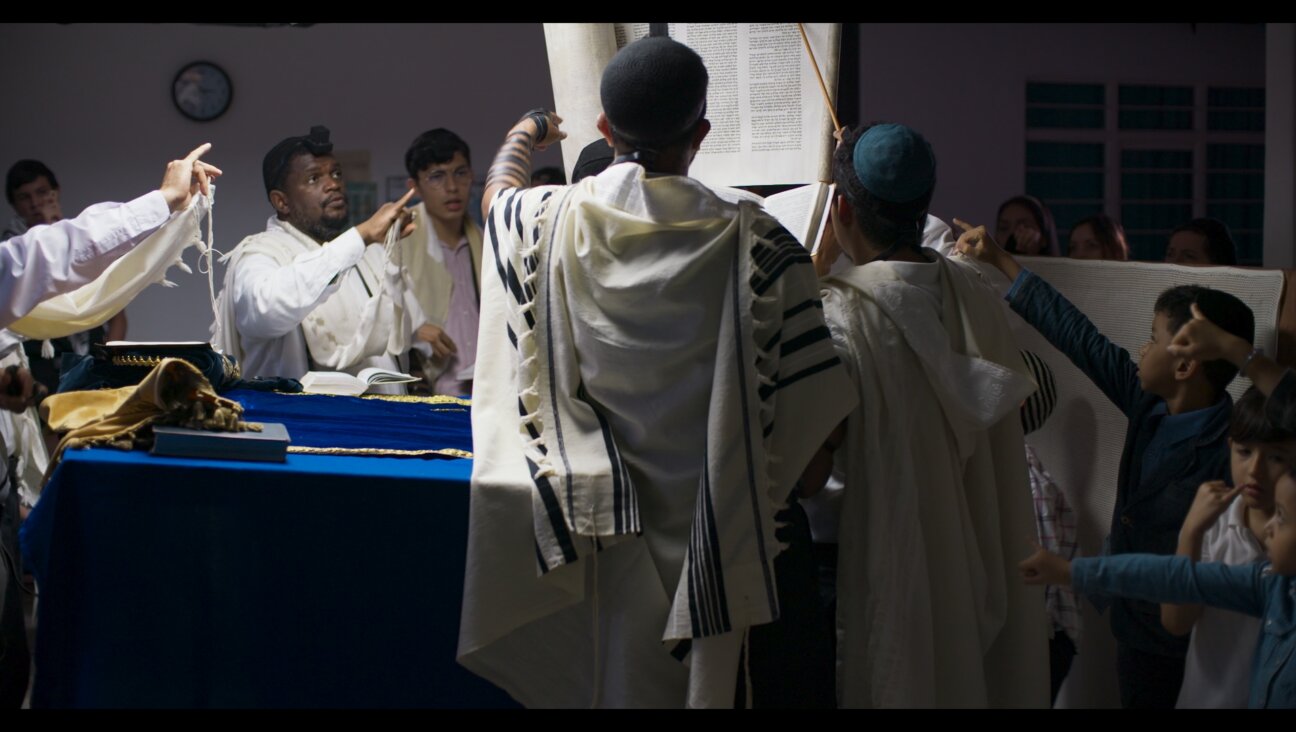And Justice for All: Curriculum Connects Learning With Action
‘Stephanie Rotsky, World Fixer” reads the sign in Hebrew and English at the entrance to Rotsky’s office at the Rashi School, a Reform Jewish day school outside Boston. It can’t be easy to live up to such great expectations, but Rotsky’s actual job title is perhaps no less daunting: social justice coordinator.
Rotsky is the only full-time employee with this job title at any Jewish day school in the United States. The former second-grade teacher was plucked from the classroom four years ago, soon after philanthropists were wowed by her Tzedakah Heroes program — a program she pioneered that highlights the work of social activists, Jews and non-Jews alike, and invites them to speak to students.
“As soon as we came through the doors of the school, we sensed that something very different was happening” said philanthropist Michael Frieze, who, along his wife, Linda, provided the seed money to create the fully funded administrative position of social justice coordinator. “You could sense the passion for social justice. It was all over the school. You could see it on the walls.”
The walls of Rotsky’s office, situated behind the school’s multipurpose room, are plastered with posters, scribbled Post-it notes, student work and decorations reminiscent of the 1960s. “This is the groovy area,” Rotsky told a reporter, gesturing with a wave of her hand to the tie-dyed banner hanging from her office’s eastern wall.
Not that she’s often holed up in there. On any given school day, Rotsky might be found chatting in the cafeteria with a group of fifth graders who want to embark on their own tzedakah project cleaning up a soccer field, or with another student who wants to create a socially conscious focus for his upcoming birthday party.
She might be in a classroom team-teaching with a second-grade teacher about the power of “big words” to effect change in the world. And then again, she might be guiding the faculty — side by side with the school’s Jewish-life educator — through a careful examination of selections from the Book of Isaiah, with a particular eye on how the prophet’s words come to bear on the civil-rights movement.
“I’ve loved every moment of it,” Rotsky said of her leadership role. “It’s profound work.”
Her presence permeates the entire school, as is noted by faculty and parents alike.
“Stephanie has helped me to help the students understand what it means to make a difference in the world,” said Sandi Intraub, a second-grade teacher at Rashi. “She works with the staff and is a constant support and guide in helping us figure out the best ways to bring social justice issues to the students… [and make it] something that is integrated into everyday life in the classroom.”
Integration is the word on everyone’s lips at Rashi, a school for kindergarteners through eighth graders that weaves Jewish studies with a social-action bent into all aspects of the curriculum. Unlike some Jewish day schools that divide the day into Jewish studies and general studies, Rashi has a team of teachers in each classroom who teach both subjects throughout the day, complemented by an array of specialists in a range of subjects, including Hebrew.
This year, Rotsky and the Jewish-life educator, Jennifer Rudin-Sable, created an integrated social justice curriculum for Passover. Students at every grade level focused on a different aspect of the Passover Seder, connected it to social justice issues in the contemporary world and then created an activity that they could “take home” to their own Passover Seders to share what they learned.
In the first grade, students studied the 10 plagues and connected them to “modern-day plagues.” In the fourth grade, students studied child labor abuses in the context of Egyptian slavery. Middle-school students studied the song “Dayenu” (“It Would Have Been Enough”) alongside the United Nations Declaration of Human Rights. Rotsky and Rudin-Sable aim to develop similar programs and curricula for all the Jewish holidays.
“We really spend a great deal of time connecting Jewish learning with Jewish action,” said Rabbi Joe Eiduson, head of the school. “Our students come away from their experience of Rashi with a good heart and a critical mind. Social justice [education] falls into both of these categories.”
He says their approach is “not earth shattering,” but merely consistent. Throughout their education at Rashi, students are encouraged to look at the world’s challenges through the prism of Judaism and contemplate the ways they personally might make a difference.
A unit on soup in kindergarten became an opportunity to study the biblical text about Esau selling his birthright to Jacob for a bowl of soup. Encouraged to reflect on problems of world hunger, students collected cans of soup and delivered them to a food pantry.
A unit on clothing became an occasion to collect tzedakah for the purchase of fabric, thread and needles to create baby quilts for “babies at risk” at a nearby children’s hospital.
Each year the school holds an annual Chanukah Tamchui program, in which all the 300-plus students are given five tokens worth $2, to be given to the tzedakah of their choice. Five different funds are available and students debate where to distribute their tokens.
Each day of the program, Rashi parent Amy Gerber recounts, students stand in front of collection buckets discussing the merits of different charities: “You have kids as young as first grade debating, ‘I don’t know, do you think it is more important to help the environment, or help the homeless?’”
Other programs that have blossomed under Rotsky’s tutelage are the school’s participation in a local food pantry, regular visits to senior adult homes and an annual participation in Boston’s “Walk for Hunger.” This fall, a “social justice artist-in-residence” — Jewish folksinger Perri Smilow — will spend a week working throughout the school.
“Judaism is pre-eminently a way of living, and not only a way of believing,” Eiduson said. “It’s not enough to believe in doing the right thing or study texts about doing the right thing. You have to actually take yourself out and do the right thing.”
A message from our Publisher & CEO Rachel Fishman Feddersen

I hope you appreciated this article. Before you go, I’d like to ask you to please support the Forward’s award-winning, nonprofit journalism so that we can be prepared for whatever news 2025 brings.
At a time when other newsrooms are closing or cutting back, the Forward has removed its paywall and invested additional resources to report on the ground from Israel and around the U.S. on the impact of the war, rising antisemitism and polarized discourse.
Readers like you make it all possible. Support our work by becoming a Forward Member and connect with our journalism and your community.
— Rachel Fishman Feddersen, Publisher and CEO























